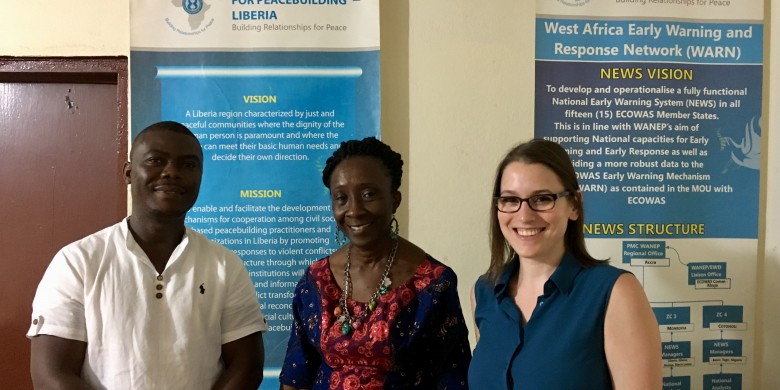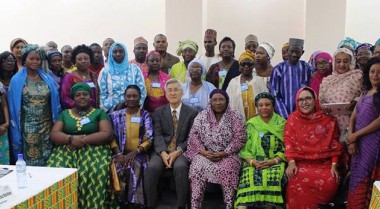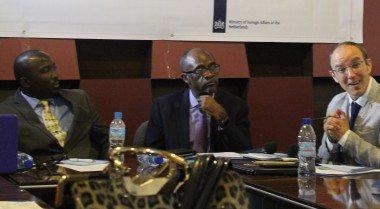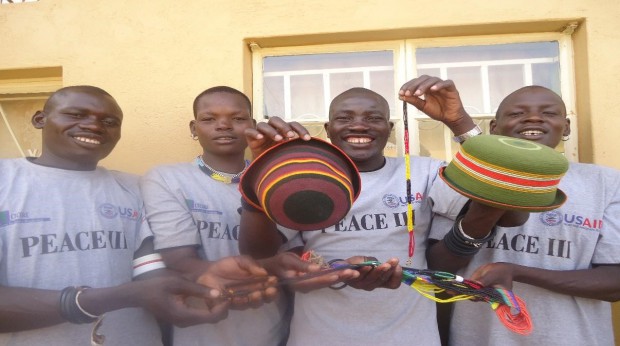Civil Society Key for Sustaining Peace in Liberia
Sustaining peace, as defined in dual UN General Assembly and Security Council resolutions (A/70/262 and S/2016/2282), is a goal and a process that considers peacebuilding within the full spectrum of the conflict cycle, and involves shifting analysis to focus on the resiliency in societies while also focusing more on prevention.
Looking to better highlight the linkages between the work GPPAC members are doing and the new sustaining peace agenda, GPPAC has started a project that aims to enhance the implementation of the sustaining peace agenda and to identify keys factors for creating sustainable peace on the ground. UN Liaison Laurie Mincieli recently travelled to Liberia as part of this research project, and had the opportunity to meet with government officials, UN leadership and civil society, including GPPAC member, the West African Network for Peacebuilding (WANEP). Throughout these interviews, it was clear that civil society is a critical source of resilience for Liberian society and should be further supported.
The significant role of civil society organisations (CSOs) was acknowledged by international actors like the UN and World Bank, as well as government officials. They were seen as organised and dedicated actors that are pushing forward peacebuilding efforts, and are largely credited for the peace that has existed since the civil war. This is in part because civil society in Liberia is working on two critical elements that will help sustain peace in the long-term: addressing root causes of conflict and supporting conflict prevention and early warning.
One overarching theme during the research in Liberia was that the root causes of conflict remain present after having been minimally addressed over the past 15 years. Some of the existing issues raised included lack of justice, inequality, and political and economic exclusion. On each of these issue areas, CSOs have created targeted programmes that help address grievances of the population in non-violent ways.
Liberian CSOs have created a number of peacebuilding mechanisms that can serve as positive models for other contexts. For instance, the civil society-led Peace Huts seek to increase understanding of and access to justice and rule of law actors in rural counties. These Peace Huts, run by WANEP, also address women's inequalities by provide safe spaces for women to express themselves on reconciliation and peacebuilding and supports their economic empowerment. Other organisations, such as Camp for Peace, try to empower youth to take a positive role in society through education, reconciliation efforts and economic empowerment. By focusing on marginalised groups such as women and youth, Liberian organisations are further strengthening civil society to maintain peace over the long-term. By addressing sources of inequality and building capacity of key members of society, the Liberian social fabric is further strengthened which will enable it to better maintain peace.

Since the civil war, robust early warning and early response mechanisms have also been instituted through good partnership between civil society, government and the regional organisation of ECOWAS. The WARN system reports on socio-political situations and provides information to policy makers quickly in order to ensure an early response to potential threats. The system also trains a broad group of society to safely and securely report any indicators they spot without fear of reprisal, which helps ensure that marginalised groups are represented. This early warning system even in played a significant role in the 2017 Presidential elections, which remained relatively peaceful and saw the opposition party elected. As conflict arose, mediators were able to be quickly deployed to diffuse tension and mediate conflicts before they turned violent. This robust prevention system in place has also played a key role in sustaining the peace in Liberia as it continuously builds the capacity of community members and leaders to identify warning signs of violence and to get appropriate, peaceful responses.
The work that CSOs are undertaking in Liberia is directly helping to create a more durable and sustainable peace. These good models of peacebuilding and conflict prevention should be further strengthened and supported by national, regional and international authorities, with civil society also participating in key policy and decision making. Ultimately, only an inclusive approach and continuous efforts by all stakeholders will ensure that peace in Liberia will be sustained.


